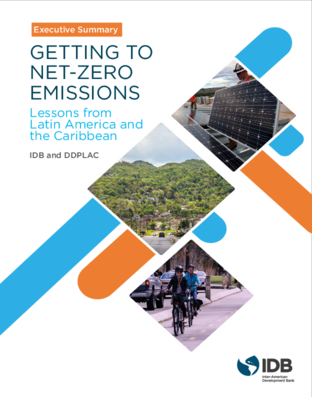Getting to Net-Zero Emissions: Lessons from Latin America and the Caribbean (Executive Summary)
Date
Dec 2019
All Latin American and Caribbean countries have ratified the Paris Agreement, which aims to limit global warming to between 1.5C and 2C above pre-industrial levels. Those goals require achieving zero net carbon dioxide emissions by 2050 and substantial reductions in CO2 emissions by 2030. Achieving zero net emissions takes stock of the lessons learned from the experiences of the teams in the countries that implemented Deep Decarbonization in Latin America and the Caribbean by the IDB and proposes approaches to develop and offer long-term pathways for zero net emissions by 2050. The report shows the essential role that long-term strategies play in terms of identifying and planning the deployment of the infrastructure and policy packages necessary to ensure a just transition to a zero net emissions economy. Long-term strategies will help governments anticipate fiscal and financial costs, manage compensation, minimize social impacts, and define the sequence of policy reforms and investment priorities necessary to achieve a carbon-neutral future. Designing long-term strategies for 2020 in line with the timeline provided in the context of the Paris Agreement can guide the establishment of more ambitious National Level Determined Contributions (NDCs) and minimize abandoned assets and associated costs. Long-term strategies are an essential instrument, both to contribute to the redirection of public and private investments, and to guide dialogue with development institutions that seek to support inclusive and sustainable development. As we read this report, we hope that decision makers and technicians get an idea of how to successfully deliver decarbonization.




